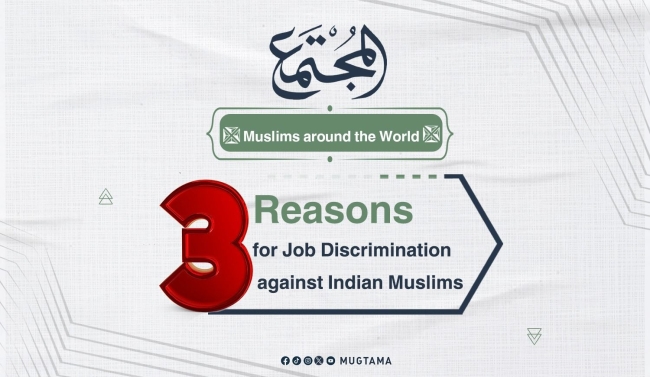3 Reasons for Job Discrimination against Indian Muslims Featured
We have often heard about the persecution practiced by successive Indian governments against Indian Muslims. This discrimination and persecution take various forms, and Indian Muslims continue to live under the pressure of Hindu discrimination, which relentlessly tries to strip them of their rights by all means, both legitimate and illegitimate.
Among the forms of persecution recently faced by Muslims in India is the phenomenon observed by human rights activists and those concerned with minority rights. This is the phenomenon of discrimination against Indian Muslims when applying for jobs to find employment through which a Muslim can support their family and meet their needs. The reasons for the Indian government's discrimination in employment matters specifically against Muslims are varied, with the most prominent being:
- The Spread of “Islamophobia” and Social Biases:
Upon closer examination, it becomes evident that the increasing “Islamophobia” in many non-Muslim societies significantly contributes to employment discrimination against Muslims. This phobia helps create negative perceptions of Muslims, such as being less loyal to the state or more associated with violence and extremism, as propagated by Hindus about Muslims in society. These distorted images negatively impact Muslims' job opportunities, and these biases easily find their way into hiring decisions, whether in the government or private sector.
- Exaggerated Nationalism:
The malicious effects of nationalism have left Muslims with little break to ensure a basic standard of living. Under nationalist governments that aim to reinforce the dominant religious identity, policies are directed in ways that increase discrimination against Muslims. For instance, calls to boycott Muslim-run businesses or questioning their national loyalty lead to their indirect exclusion from the job market. These practices bear fruit in the absence of legal oversight to protect minority rights as enshrined in the constitution and international treaties.
- Lack of Support and Equality:
Ensuring a decent living for minorities minimally requires the provision of social and professional support, alongside equality with other societal groups, especially on the professional level.
However, the reality in India is quite the opposite. Muslims often lack professional support networks that could help them secure job opportunities. Many jobs rely on personal relationships and social networks, which may be unavailable or weak in Muslim communities due to deliberate marginalization. Furthermore, policies aimed at promoting diversity and equality do not always include religious minorities, clearly affecting Indian Muslims.
From this perspective, it becomes evident that employment discrimination against Muslims is a significant challenge that must be addressed promptly and decisively. This can be done by strengthening laws that grant them the right to work according to their available skills, increasing awareness about the importance of integrating them into society to achieve desired development, and adopting inclusive employment policies that create a fair and diverse work environment, giving everyone an equal opportunity to grow and succeed.
-------------------------------------------------------------


